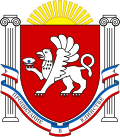| | ||||||||||||||||||||||||||||||||||||||||
| ||||||||||||||||||||||||||||||||||||||||
All 100 seats in the Verkhovna Rada of Crimea 51 seats needed for a majority | ||||||||||||||||||||||||||||||||||||||||
This lists parties that won seats. See the complete results below.
| ||||||||||||||||||||||||||||||||||||||||
| This article is part of a series on the politics and government of |
| Crimea |
|---|
 |
| Autonomous Republic of Crimea (within Ukraine, 1991–present) |
|
| Republic of Crimea (territory occupied by Russia 2014–present) |
| See also |
| Political status of Crimea Politics of Russia • Politics of Ukraine |
The 2010 Crimean parliamentary election was held on 31 October 2010 as a part of the general 2010 Ukrainian local elections. Unlike the previous election to the Verkhovna Rada of Crimea, they were conducted on the mixed-member proportional representation system. In order to gain representation in the Parliament of the Autonomous Republic of Crimea, a party or bloc had to garner at least 3 percent of the total vote. The Party of Regions won the elections with an overwhelming majority. [1] This was the last parliamentary election in Crimea before annexed by Russia.
